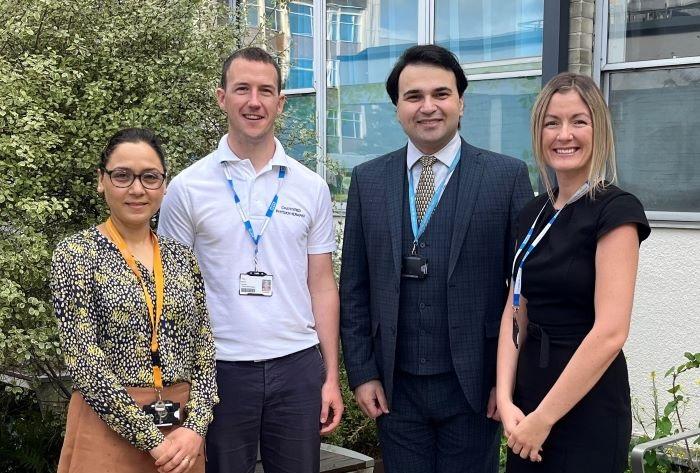NPH is caused by an abnormal build-up of fluid in the brain, and leads to memory loss, poor balance, and bladder problems. It typically affects people over 65 and is frequently mistaken for untreatable forms of dementia like Alzheimer’s disease, when in fact it is potentially reversible with shunt surgery.
A shunt is a small valve connected to a tube which is inserted into the brain and diverts fluid elsewhere in the body, usually the abdomen.
The new clinic is part of the Reversible Dementia (REVERT) project, a cross-border collaboration between the UK and France that is led by the University of Cambridge and aims to share best practice internationally.
The team, headed by consultant neurosurgeon and REVERT Clinical Lead, Mr Alexis Joannides, consists of a clinical neuropsychologist, a specialist physiotherapist, an advanced nurse specialist, and a service co-ordinator.
Because of the wide range of experienced clinicians involved, patients attending the one-stop clinic quickly and easily get an initial assessment that includes a medical consultation, cognitive evaluation (memory test), and gait assessment (walking test).
The clinic is the first step on the pathway to diagnose NPH, and those thought to have the condition will go on to have advanced diagnostics including a lumbar infusion study and specialised brain MRI.
The lumbar infusion study, a technique pioneered by the Brain Physics Laboratory in Cambridge, involves putting fluid into the spine via a needle and calculating the resistance of cerebrospinal fluid leaving the brain. If the tests are consistent with NPH, then surgery may be considered to insert a shunt.
Mr Joannides, who is also Deputy Director of the NIHR Brain Injury MedTech Co-operative, said: “We are incredibly proud of what we have achieved within the Trust and what it means for our patients.
“Our multidisciplinary clinic will improve patient experience: the one-stop approach will save time and money and reduce the number of hospital visits for patients. It will also provide more in-depth assessment to help us offer tailored care and support to patients with NPH alongside their clinical treatment.”
The REVERT project is funded by the European Regional Development Fund (ERDF) via the Interreg France (Channel) England Programme. To learn more, visit https://revertproject.org/
The clinic takes referrals from GPs and specialists in the East of England and beyond. Anyone worried about memory loss should speak to their GP.
Image: Left to right are: Indu Lawes ((Lead CSF Nurse Specialist), Toby Meek (Specialist Physiotherapist), Alexis Joannides (Consultant Neurosurgeon) and Lisa Healy (Clinical Neuropsychologist).



